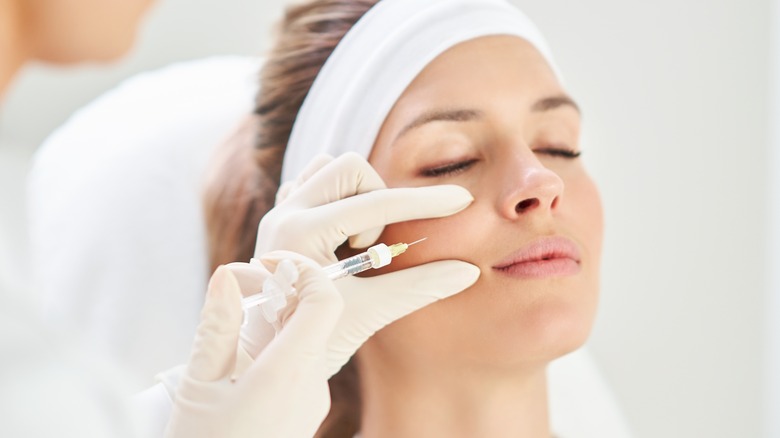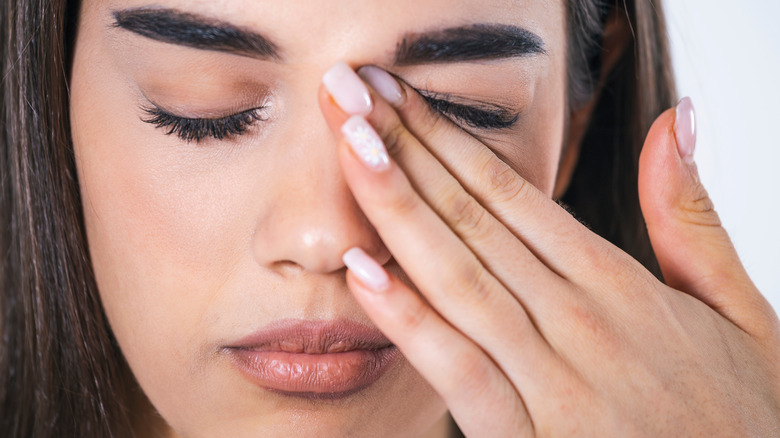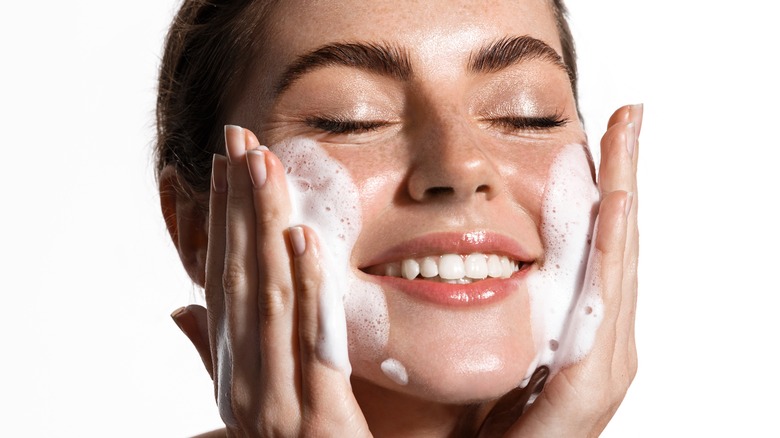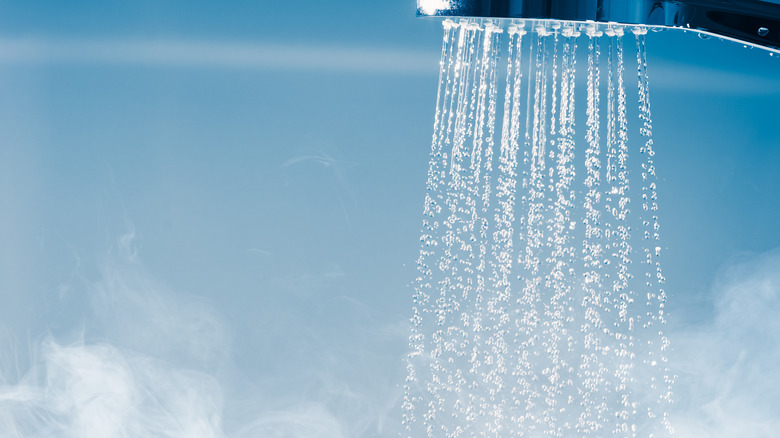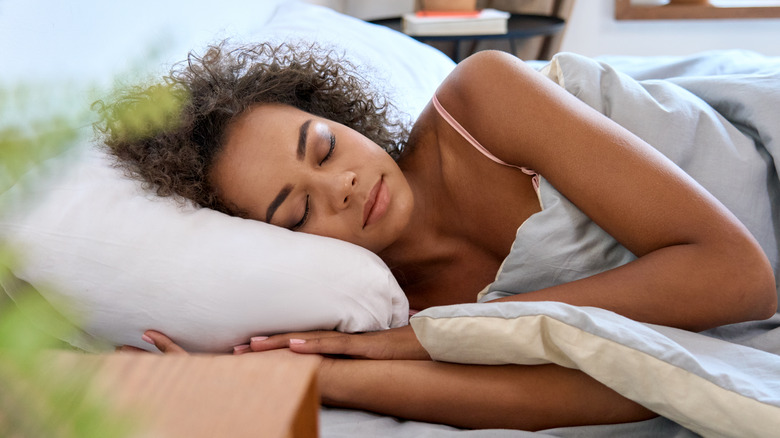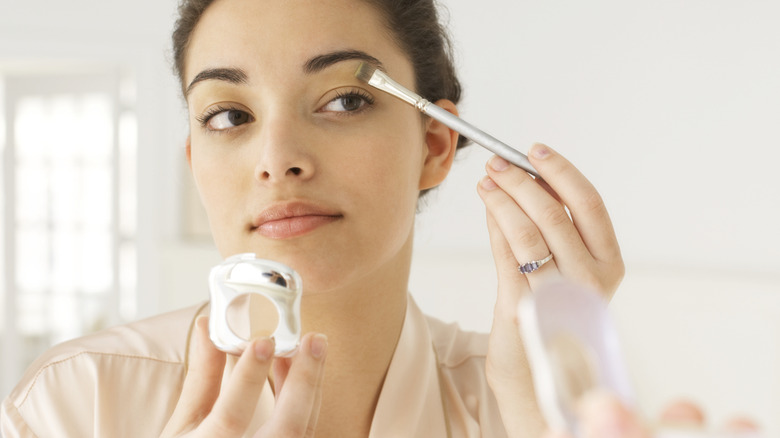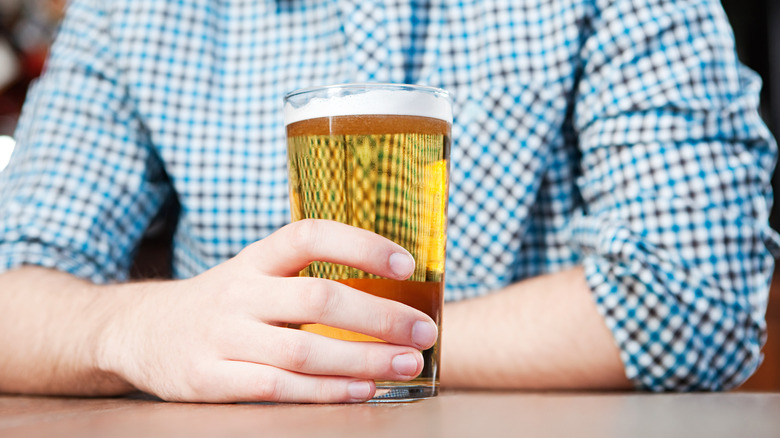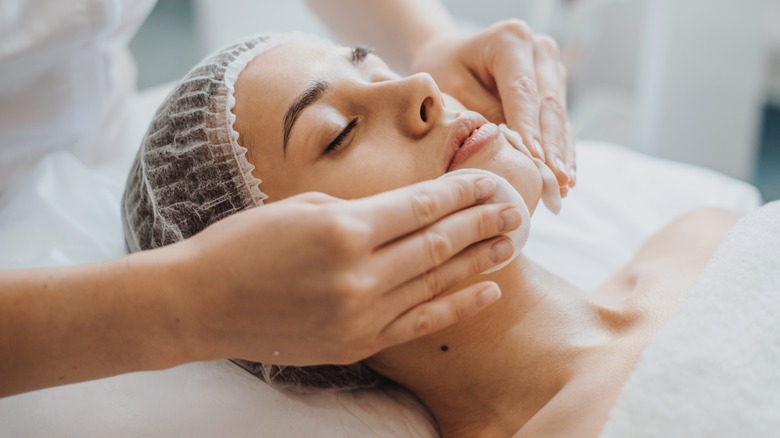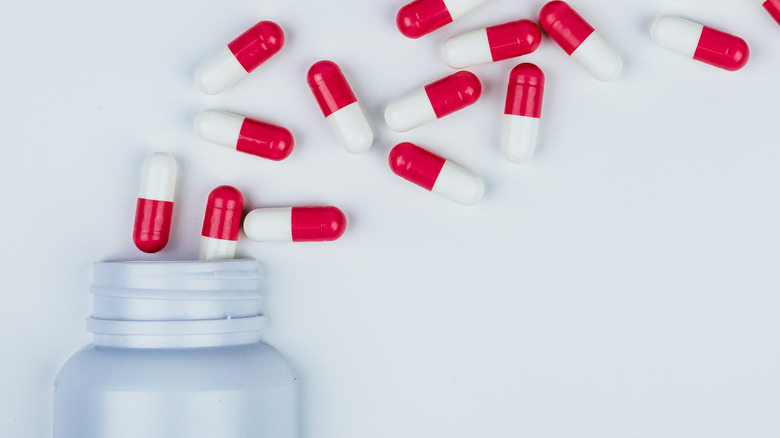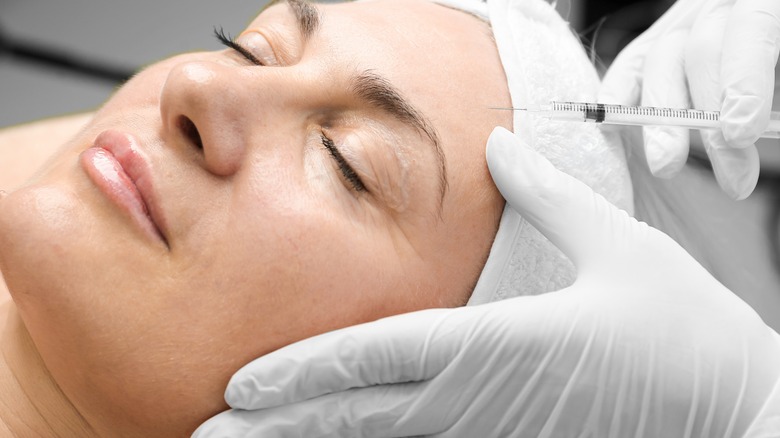Things You Should Always Avoid After Getting Botox
Aging is an undeniable aspect of life that happens to all of us, along with the wrinkles and fine lines it typically brings. Since its invention in 1989, botox has become increasingly popular to help slow down the process (per Dazed).
Botox is a procedure that injects a neurotoxin called botulinum toxin that targets the nerves and helps weaken and relax muscles and smooth out wrinkles. However, the treatment can also be used for medical reasons, such as addressing facial spasms or treating migraines.
Generally, botox is applied by a licensed medical professional anywhere on the face, with the most common areas including the eyebrows, forehead, nose, eyes, lips, chin, and jawline area. While the procedure doesn't require any recovery time, it does come with post-treatment instructions (e.g., avoiding a number of different activities for a short period of time). After all, if you are investing time and money on getting botox done, why not ensure proper aftercare to get the best possible results? That's why we're here to give you a list of everything that you need to avoid after getting botox done.
Going out in the sun
According to a study published in Cold Spring Harbor Perspectives in Medicine, sun exposure over a prolonged period of time can lead to aging of human skin. Because sunlight is powerful enough to be damaging without proper protection, it makes sense to avoid it immediately after your botox treatment.
Now, of course, it isn't really possible to completely avoid the sun's light. Fortunately, it can still be tolerated in small bursts after a person receives botox treatment. With that said, it is probably best to not plan a beach day right after getting botox done. This is because botox can be accompanied with side effects like swelling or bruising, which may get aggravated by direct sun exposure as well as elevated temperatures (per Your Laser Skin Care).
Instead, it is advisable to use strong sunscreen and limit sun exposure for at least 24 hours after receiving treatment. In addition, it can be worthwhile to consider getting botox done during the winter months, in order to reduce your chances of elevated temperatures and prolonged sun exposure.
Touching or rubbing your face
While this one may seem rather obvious, it can be hard to remember to avoid touching or rubbing your face after botox. However, it's important to do so in order to prevent irritating the areas in which treatment has occurred.
A procedure like botox needs time to settle in order to achieve the best results (per Dr. Adams Plastic Surgery). For this reason, it is ideal to avoid massaging the treatment area, in order to prevent displacing the botox or causing unnecessary swelling or scarring.
It can also be helpful to avoid itching or scratching your face. Instead, using a light touch is advisable, as it will help stop the botox injection from spreading to the other areas of the face. However, you can resume touching or massaging your face as usual after 24 hours, once the skin settles and is smoother and firmer (per Cedarburg Family Wellness & Aesthetics Center).
Washing your face aggressively
Keeping your face clean after a medical procedure is an important part of the process, and botox is no exception (via Great City Medical). Doing so can prevent your skin from getting irritated or being infected. However, washing your face with too much force post-botox is something you should certainly avoid, or you might end up bruising your skin.
When washing your face after receiving botox treatment, be sure to do so with a very light touch, a gentle cleansing agent, and either cold or warm (not hot) water. It is also important to refrain from scrubbing or rubbing your face. In addition, you should avoid using any chemical peels, topical creams (e.g., Retin A), or abrasive cleansers on your face. For the best possible results, The Laser Cafe Medical Spa suggests waiting at least 6 hours after your treatment before washing your face or applying your usual moisturizer or cream.
Excessive exercising
If you exercise too soon after botox, it can negatively impact your results and reduce the effectiveness of the procedure. This is why it is recommended that patients avoid most types of rigorous exercises for at least 24 hours after the treatment, per Le Reve Skincare & Laser Center.
Exercising can put too much pressure on the treated area and cause the botox to migrate from the area in which it was injected. This can result in droopy eyelids or asymmetrical features (via Westlake Dermatology & Cosmetic Surgery). In addition, strenuous movement can increase blood flow to the area and dilute the injection, thereby minimizing its effectiveness.
Any vigorous movement (e.g., jogging, swimming, or cardio workouts) can also cause movement in facial muscles, which may lead to swelling or bruising and increase the length of time it takes for the side effects to subside. Therefore, it is best to avoid strenuous activity immediately after treatment. Instead, you can try resting and sticking to light exercises like walking.
Hot showers or saunas
Who doesn't love a nice, hot shower? While they can be comforting, hot showers or saunas increase the body's temperature as a result of the heat, which can in turn cause bruising and irritation at the site of your injection (via Health & Aesthetics). Needless to say, this can have a significant impact on the results of your botox treatment.
For this reason, hot baths, showers, and pools should all be avoided for at least 24 hours after treatment, according to Le Reve Skincare & Laser Center. Tanning beds and heat lamps should also be avoided. It's also a good idea to shower in cold (or at least lukewarm) water. Another option is to shower right before your appointment.
With that said, you may be tempted to apply ice to the injection area to relieve swelling and redness. Per Health & Aesthetics, it's not a good idea to apply any sort of pressure on the part of your body where botox was injected. Instead, you can take arnica tablets for pain relief, or wrap some crushed ice in a towel and apply it — but not press it — on your skin (via Tanna MD).
Lying down
For some folks, a nap can usually solve most things. But after getting botox done, it may not be the way to go. This is because lying down right after the first few hours of injection can spread the botulinum toxin around your face and away from the areas in which you got injected (per Takle Eye Group). This can create an unnatural look on your face, ultimately messing with your desired outcome. For this reason, it's probably best to avoid lying down right after your treatment.
On the first night after getting botox, try to sleep on your back rather than on your side. This will minimize the amount of pressure experienced by the treatment areas, while preventing additional rubbing or tugging from occurring. You can also try elevating your head with more pillows in order for your treatment to remain intact and to reduce swelling and inflammation (via The Luxe Room).
Wearing makeup
A common question after botox treatment is whether a person can wear makeup immediately after the procedure. While you may want to show off your face after your procedure and add some makeup to highlight the effects, it is best to wait up to six hours before doing so, per Beatitude Aesthetic Medicine.
This is because the botox procedure utilizes a small needle to inject botox into the face. So, after the procedure, you will have tiny punctures on your skin, which can pose problems if you decide to wear makeup immediately after the treatment. To avoid any infection or complications, it is best not to apply makeup on your face for at least 24 hours after getting botox (per Makeup Muddle).
If you feel that you must wear makeup after your treatment, opt for lightweight and oil-free products that won't clog your pores and still allow your skin to breathe.
Drinking alcohol
If there's one thing on this list that can especially hamper your botox results, it's alcohol. While a glass of wine after a long day may seem like no harm done, it is best to steer clear of alcohol immediately before or at least 24 hours after treatment (per AVID Clinic).
According to Healthline, alcohol can thin your blood, making it more likely that you'll experience bruising at the site of your botox injection. In addition, alcohol can widen your blood vessels and heighten the risk of swelling, while also drying out your skin. Plus, the risk of dizziness and drowsiness, which are both side effects of botox and alcohol, can greatly increase if the two are paired together (via Generations Medical Aesthetics). So, if this is your first time getting botox done, then it may be a good idea to go ahead and skip drinking until you know how your skin reacts to botox.
Skin treatments
You may want to hold off on booking a facial or waxing appointment for a few days after getting botox done. According to Healthline, even seemingly ordinary skin treatments such as professional massages, facials, and exfoliating scrubs should be avoided up to two days after your procedure. Consider the fact that your skin is already sensitive after botox, which means any of these treatments can increase your chances of sustaining lasting damage to your skin.
Understandably, no one likes straying from their established personal skin care routine. With that said, it's important to hold off on applying facial care products or letting other people apply pressure to your face after you get the injection — at least, until your skin heals and the botox properly settles into the muscles. Aside from reducing the chances of any unwanted side effects or allergic reactions from occurring, this also maximizes the effectiveness of your botox treatment.
Taking blood thinners or NSAID pain relievers
As the British Heart Foundation explains, blood thinners stop the body from producing clots, which can lead to more serious health issues like a heart attack. While this is an extremely important function, it's worth noting that many patients notice more swelling or bruising after starting blood thinners. If you've just gotten botox, bruising and swelling are already possible side effects of the treatment — and adding blood thinners to the equation only increases the chances of bruising.
For this reason, it is best to avoid blood thinners for around three to five days before and for up to a day after your treatment, if possible (per Cosmetic Surgeons of Michigan). While non-steroidal anti-inflammatory drugs (NSAIDs) like ibuprofen and aspirin should also be avoided, Tylenol is safe to take for pain after your treatment (per Sereno Santé).
With that said, it is not always possible to stop taking certain kinds of medication pre- or post-botox, especially if a person's health situation necessitates their use. For this reason, be sure to always consult your doctor before getting botox (and before taking any blood thinners or painkillers after the procedure).
Side effects of botox
Of course, no cosmetic procedure comes without its own set of risks and side effects. Botox injections are typically performed with a fine needle, and can result in swelling, tenderness, pain, and slight bruising at the injection site. According to the Mayo Clinic, headaches and flu-like symptoms, drooling or a crooked smile, droopy eyes, and some eye dryness and tearing are among the potential side effects of botox injections. In addition, if you repeatedly undergo or overuse botox treatment, muscle weakness in facial muscles can occur and cause slow deterioration (via Your Laser Skin Care).
However, these reactions only occur in a small percentage of patients, and are not guaranteed to happen if you get botox. What's more, your healthcare provider will be able to suggest treatment options for most unwanted side effects of botox treatment. For instance, they may recommend eye drops for droopy eyes. Lastly, if you are pregnant, breastfeeding, or have any neurological diseases, it is crucial to check with your doctor first before getting botox.
When to see a doctor
The good news is that most patients typically don't experience any serious negative side effects from getting botox (per Blush Beverly Hills). However, that doesn't mean they won't arise, or that a visit to your doctor won't be necessary. In the event of any major complications (e.g., an allergic reaction, difficulty breathing and swallowing, or muscle weakness), it is best to see your doctor right away.
It is important to note that botox is not reversible, which means that certain side effects such as frozen face can't be instantly addressed. Fortunately, experts say that the body does naturally metabolize it over the course of approximately 120 days (per Right Clinic). In other words, if you're worried that too much botox was injected into your body during your procedure, you can rest easy knowing that any unpleasant effects will likely wear off after a period of time.

